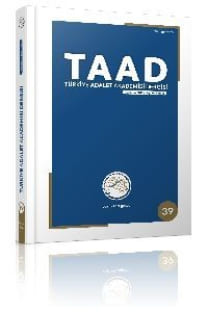The conditions to apply the provision on remorse for the offences agains property
The conditions to apply the provision on remorse for the offences agains property
The offender can display remorse after he/she has committed an offence. In this case, the offender does not insuppressible the offence. However, in some offences it is possible to remove the damage caused by the offence partially or totally. Having foreseen this possibilitiy, the law-makers set out the provision on effective remorse under Article 168 of Turkish Penal Code. In case the offender is regretful after the commission of the offence has been completed, it is only possible to mention about effective remorse which is an individual circumtance if the harm inflicted on the victim is repaired by returning the property acquired by way of the offence or compensating its value. There is no requirement to express the remorse by words, depending on particularities of the case, it can be expressed by words or acts. The phrase "displaying remorse individualy" contained in the wording of the article is a clear illustration of the importance attached to restitution and compensation after the remorse rather than to restitution and compensation alone. It is not easy to identfy the will for remorse, since it concerns inner world of the offender. For this reason, in case the offender does not display any words and acts both in trials and after the offence which reflects his remorse and the property is returned, the restitution must be p resumed t o b e c arried a s a r esult o f t he r emorse. It is not necessary for the offender to restitute the property personaly. The restitution carried out by others with the permission and approval of the offender is not impediment to apply the provision on remorse. This paper examines the conditions under which the provision on remorse is applied for property-related offences with different opinions and the judgments of the Court of Cassation in various aspects.
___
- ANTALYALI Mehmet, Mala Karşı Suçlarda Etkin Pişmanlığın Şartları, www.online-hukuk.org/makale/mala-karsi-islenen-suclarda-etkin-pismanlik- hukmumun-uygulanmasi-icin-fail-pisman-olmalidir.html. Erişim Tarihi: 17.06.2011
- ARSLAN Çetin/AZİZAĞAOĞLU Bahattin, Yeni Türk Ceza Kanunu Şerhi, Asil Yayın Dağıtım, 2004
- ARTUÇ Mustafa, Malvarlığına Karşı Suçlar, Kartal Yayınevi, Ankara 2007
- ARTUK Mehmet Emin/GÖKÇEN Ahmet/YENİDÜNYA Ahmet Caner, Türk Ceza Kanunu Şerhi Özel Hükümler, 4.Cilt, Ankara 2009
- AYVERDİ İlhan, Misalli Büyük Türkçe Sözlük, MAS Matbaacılık, Mart 2006, 2. Baskı, Cilt 3
- BAKICI, Sedat, 5237 Sayılı Yasa Kapsamında Ceza Hukuku Özel Hükümler 1, Adalet Yayınevi, Ankara 2008
- CENTEL Nur, Türk Ceza Hukukuna Giriş, Beta Yayınları, İstanbul 2002, 2. Baskı
- DONAY Süheyl, Türk Ceza Kanunu Şerhi, Beta yayınları, 2007
- DÖNMEZER Sulhi, Kişilere ve Mala Karşı Cürümler, Beta Basım Yayıncılık, İstanbul 2004, 17.Baskı,
- ESEN Sinan, Malvarlığına Karşı Suçlar Belgelerde Sahtecilik ve Bilişim Alanında Suçlar, Adalet Yayınevi, Eylül 2007
- GERÇEKER, Hasan, Yorumlu Uygulamalı Türk Ceza Kanunu, Ankara 2011, 1.Baskı, 2.Cilt
- GÜNAY, Erhan, Öğreti ve Uygulamada Yeni Türk Ceza Kanunu’ndaki Etkin Pişmanlık ve Gönüllü Vazgeçme, Seçkin Yayınevi, Ankara 2006, 1. Baskı
- GÜNDEL Ahmet, Yeni Türk Ceza Kanunu Açıklaması, Ankara 2009, 3. Cilt
- HAFIZOĞULLARI Zeki/ÖZEN Muharrem, Türk Ceza Hukuku Özel Hükümler Kişilere Karşı Suçlar, USA Yayıncılık, Ankara 2010
- KILDAN İsmail Turgut, Hükmün Açıklanmasının Geri Bırakılması Kurumunun Yargıtay Kararları Işığında İncelenmesi, Adalet Dergisi, Eylül 2009, Sayı 35
- KÖŞŞEKOĞLU Abdullah, 5237 Sayılı Türk Ceza Kanunu’nda Etkin Pişmanlık, Editörler ÜLGEN Celal/ONGUN Coşkun, Avrupa Birliği’ne Uyum Sürecinde Türk Ceza ve Ceza Muhakemesi Hukuku, İstanbul Barosu Yayınları, Ekim 2008, 1. Basım
- MALKOÇ İsmail, Açıklamalı-İçtihatlı 5237 Sayılı Yeni Türk Ceza Kanunu, Malkoç Kitabevi Yayınları, 3. Baskı, 1.Cilt
- MERAN Necati, Açıklamalı – İçtihatlı 5237 Sayılı Yeni Türk Ceza Kanunu, Seçkin Yayınevi, Ankara 2007
- NOYAN, Hırsızlık Suçları, Adalet Yayınevi, Ankara, 2007
- ÖZBEK Veli Özer, Yeni Türk Ceza Kanununun Anlamı, İzmir Şerhi, Seçkin Yayınevi, Ankara 2008, Cilt 2
- ÖZBEK Veli Özer/KANBUR Nihat/BACAKSIZ Pınar/DOĞAN Koray/TEPE İlker, Türk Ceza Hukuku Genel Hükümler, Seçkin Yayınevi, Ankara 2010, s.450
- ÖZEL Cevat, Türk Ceza Kanununda ve Bankacılık Kanununda Etkin Pişmanlık, http://www.hukuki.net/hukuk/index.php?article=900 , Erişim Tarihi: 27.08.2011
- PARLAR Ali/HATİPOĞLU Muzaffer, Açıklamalı-Yeni İçtihatlarla 5237 Sayılı Türk Ceza Kanunu Yorumu, Seçkin Yayınevi, Ankara 2010, 3. Cilt
- SOYASLAN Doğan, Ceza Hukuku Özel Hükümler, Yetkin Basımevi, Ankara 2002, 4.Baskı
- TC Adalet Bakanlığı Yayın İşleri Dairesi Başkanlığı, Tutanaklarla Türk Ceza Kanunu, Ankara-Şubat/2005
- TEZCAN Durmuş/ERDEM Mustafa Ruhan/ÖNOK Murat, 5237 Sayılı Türk Ceza Kanununa Göre Teorik ve Pratik Ceza Özel Hukuku, Seçkin Yayınevi, Ankara 2007
- TOROSLU Nevzat, Ceza Hukuk Özel Kısım, Savaş Yayınevi, Ankara 2010
- TOROSLU Nevzat, Ceza Hukuku Genel Kısım, Savaş Yayınevi, Ankara 2011
- UYAP Yargıtay Karar Sorgulama
- YURTCAN Erdener, Türk Ceza Kanunu ve Yorumu, Kazancı Hukuk Yayınları, 2006, 2.Bası
- YURTCAN, Erdener, Yargıtay Kararları Işığında Malvarlığına Karşı Suçlar, Beta Yayınları, Ocak 2008
- ISSN: 1309-6826
- Başlangıç: 2010
- Yayıncı: Türkiye Adalet Akademisi
Sayıdaki Diğer Makaleler
Navlun sözleşmesi ile konişmento arasındaki ilişki
Türkmenistan milletlerarası doğrudan yatırım hukukunun genel değerlendirmesi
Yabancı mahkeme kararlarının icrası ve devletlerin yargı bağışıklığı
5941 Sayılı çek kanunu’na ilişkin eleştiriler ve değişiklik önerileri (uygulama ve doktrin)
Hekimin aydınlatma yükümlülüğü ve kişilik hakkı İle ilişkisi
The conditions to apply the provision on remorse for the offences agains property
6762 ve 6102 Sayılı Türk ticaret kanunlarında anonim ortaklıklarda azınlık hakları
